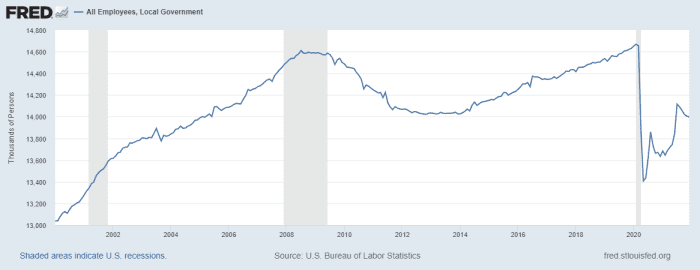In Azle, Texas, a small city west of Fort Worth, the waste disposal department is understaffed. “Residents may experience a delay in trash/recycling or yard waste collection,” the city said in a release. “You may also experience a delay in response to calls to Customer Service.”
Thousands of miles away, more than 100 staffers of the San Francisco Municipal Transportation Agency have contracted COVID-19 since late December, that agency said recently. “Combined with pre-existing staffing shortages, this has led to an increase in missed Muni service. We’re also experiencing staffing impacts in other job classifications, including mechanics, car cleaners and transit supervisors. Currently, we are missing up to 15% of scheduled Muniservice.”
All across the country, the highly contagious omicron variant has smacked cities and towns already managing with staff levels that were too lean. State and local governments shed over a million jobs in spring 2020, and many more implemented hiring freezes and other measures. In mid-2020, local government staff levels were at a two-decade low. That’s leading to cuts in services, staff burnout, and a grim sense that there’s no end in sight.

Source: St. Louis Fed
“We are struggling to fill open positions,” said Kristine Brock, assistant city administrator and CFO for the city of Franklin, Tennessee.
Over the years, Franklin’s staff has averaged a 3.5% vacancy rate. Since roughly the start of the pandemic, it’s been 10%, Brock said, in an interview.
One area that’s particularly hard to hire for is people with commercial drivers’ licenses for garbage pickup, she said. So far, Franklin has managed to continue garbage pickup uninterrupted, but only by elongating the weekly schedule, having some drivers work overtime, and sending supervisors out to collect, she said.
Waste management may be one of the city services most heavily impacted, according to an informal Google search, which turned up delays in Gainesville, Fla, Baltimore and throughout Middlesex County, N.J., among other spots.
Also delayed: school bus rides in Wake County, N.C, where 15% of the bus routes are without a driver, according to local reporting, and public transportation in Chicago, according to that city’s transit agency.
In Pulaski County, Ark., delays in the criminal court system have compounded so much that courts there face a caseload three times its normal size. The Jackson County Courthouse in Missouri similarly suspended service “as a result of the unique and changing circumstances existing at this time.”
In Benicia, Calif., that city’s finance manager, Bret Prebula, told MarketWatch that omicron was exacerbating an existing shortage.
Related: Local-government employment in the U.S. is at a 19-year low
“We had pre-COVID staffing problems with compensation and an ability to get enough money to attract talent,” Prebula said. “That has created a leanness in the operation that’s made it difficult on the staff. You can’t maintain that long-term.”
Prebula hopes the current crisis will offer an opportunity for city governments to rethink how they offer services. “We have to think about embracing efficient technology: how we look at remote work, remote community service delivery,” he said. “Government is often stuck in this manual, physical, locational way of doing business, and we’ve got to move beyond that.”
Kristine Brock sees a similar fatigue in her staff. “We’re working as hard as we can, but it’s not necessarily sustainable,” she said.
Brock recognizes it’s especially hard to hire the people needed to do things like drive commercial vehicles when the private sector is struggling to fill the same positions, but usually with more attractive compensation.
“We’re working to convey the message of the mission of local government,” she said. “Perhaps that communication has to be modernized for the world we’re in now. We still firmly believe in the value of public service. We’re just going to have to find new ways to recruit and retain employees that share that value.”
Read next: ‘Representation at the table’: Can state and local governments attract the next generation of Black talent?
